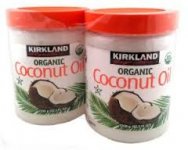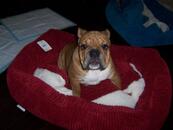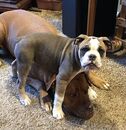violetrose
New member
- Sep 2, 2013
- 26
- 0
- Country
- United States
- Bulldog(s) Names
- Logan
So I've been trying to figure out Logan's itchiness. I'd posted back in June about his weird red spots he had developed all over his tummy and legs -- like hives -- and for a while it seemed he was getting a new spot or 3 a day. Due to itching until raw he got infected and ended up doing 2 separate courses of antibiotics, first cephalexin and then cipro. Also tried prednisone which was terrible for him. Anyway, while finishing the cipro I switched him to home-cooked ground beef and rice diet. His spots cleared up and after another week on the ground beef & rice I started switching him back to kibble. He was on Blue Buffalo Basics turkey and potato from age 3 months and I attempted to transition him back to the adult formula of it. No new spots/hives, but he just seemed more itchy than usual. He does like to be scratched a lot, particularly on his rump. I also took him back to day care. Day care seems to be good for his spirit but not good for his skin. He always comes home pretty dirty and I give him a good wash (medicated shampoo). Next morning pretty invariably he is rashy and his eyes are more goopy (thick mucus). Usually clears up with benedryl for a day. Now this time though he's stayed itchy to the point where he's chewing on his legs some and is getting scabby down his back/hips. So I went back to analyzing his diet and I then tried Blue Buffalo Wilderness Salmon, took a week to transition, then another couple weeks on the food. Still itchy and now more scabby. So I transitioned him to Core Wellness Ocean which he finds yummy and threw out all his treats of various types and picked up ones that have no chicken meal and are whitefish & potato, or apple & yogurt based (blue health bars & wellness wellbars). He's still pretty itchy and scabby. So not going back to daycare until I can figure this out and perhaps not at all (although he will miss his friends).
So I'm contemplating another food switch. Maybe to a Fromms. He seemed to do well on the cooked ground beef and rice so maybe the Beef Frittata. While I'm winding down the Core Ocean, however, I was wondering if maybe I should add some coconut oil to see if that helps. So, my question, and reason for this post is to ask, what brands coconut oils do y'all use? And where can I get it from? I searched amazon and there seems to be a lot of types and forms and varied reviews.
Updated photos of Logan (in his 57lb glory, note being muddy is his favorite activity.)


So I'm contemplating another food switch. Maybe to a Fromms. He seemed to do well on the cooked ground beef and rice so maybe the Beef Frittata. While I'm winding down the Core Ocean, however, I was wondering if maybe I should add some coconut oil to see if that helps. So, my question, and reason for this post is to ask, what brands coconut oils do y'all use? And where can I get it from? I searched amazon and there seems to be a lot of types and forms and varied reviews.
Updated photos of Logan (in his 57lb glory, note being muddy is his favorite activity.)








